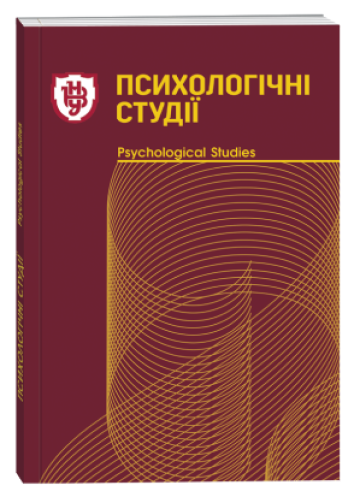PSYCHOLOGICAL FEATURES OF WILL DEVELOPMENT OF PERSONS WITH DISABILITIES / HEALTH DISORDERS
DOI:
https://doi.org/10.32782/psych.studies/2023.3.9Keywords:
health limitations, children's cerebral palsy, volitional sphere, self-image, psychophysiological disorder, developmentAbstract
For a long time, the concept of will was one of the three main categories of psychology (mind, feeling, will). The question of the essence of the will from the very beginning of its study was closely related to the problem of motivation, to the problem of explaining the reasons and motivational mechanisms of human activity. And this is not by chance, since these areas of psychological science study, in fact, the same problem – the problem of mental mechanisms that determine the presence of conscious, purposeful human behavior. One of the understudied factors that mediate the development of the individual's volitional sphere is the influence of certain health defects. In the study, we reveal the influence of somatic defects, in particular, cerebral palsy, which occurs from birth and mediates the development of a person's will and volitional sphere, since it is in early childhood that the formation of certain states of consciousness and patterns of behavior in various life situations begins. In our work, we carried out a theoretical analysis of this issue. But they revealed the problem of the development of the volitional sphere of young men with limited health opportunities. A key traumatic factor in the development of the volitional sphere of a person with cerebral palsy is the deep experience of a complex of physical inferiority. The individual characteristics of psychophysical disorders during the development of a child with cerebral palsy have a very noticeable effect on the development of his volitional sphere and the formation of his self-image, that is, the system of ideas about himself as a person, on the basis of which his relations with society are formed. After all, any bodily defect changes a person's attitude to the world, to himself, and affects his relationships with people. The uniqueness of each child forms its unique and unique outlook and inner world. However, schoolchildren of adolescent age with limited health opportunities have certain problems in the development of the volitional sphere, which have their own basic specificity.
References
Бочелюк В. Й., Турубарова А. В. Психологія людини з обмеженими можливостями. Київ : Центр учбової літератури, 2011. 264 с.
Вах дер Стам Б. Допомога дитині при церебральному паралічі: практичні поради. Львів : Світ, 1995. 120 с.
Воростін К. Д. Дитячі церебральні паралічі. Харків : Медицина, 2013. 128 с.
Грицюк І.М. Особливості розвитку дитини з дитячим церебральним паралічем. Освіта регіону. Політологія. Психологія. Комунікації. Київ : Університет «Україна», 2013. С. 295–298.
Інтеграція молоді з обмеженими фізичними можливостями в суспільство: громадсько-правові, соціально-психологічні та інформаційно-технологічні аспекти / Є. А. Клопота та ін. Запоріжжя : ЗНУ, 2008. 114 с.
Кордунова Н. О., Савчук І. О. Психолого-педагогічний практикум. Луцьк : ПП Іванюк В.П., 2020. 78 с.
Нижник Л., Сагірова О. Допомога дітям з особливими потребами. Київ : Ред. загальнопед. газ., 2004. 120 с.
Синьов В. М. Розумова відсталість як педагогічна проблема. Київ : Знання, 2007. 345 с.
Савчин М. В., Василенко Л.П. Вікова психологія. Київ : Академвидав, 2011. 384 с.







